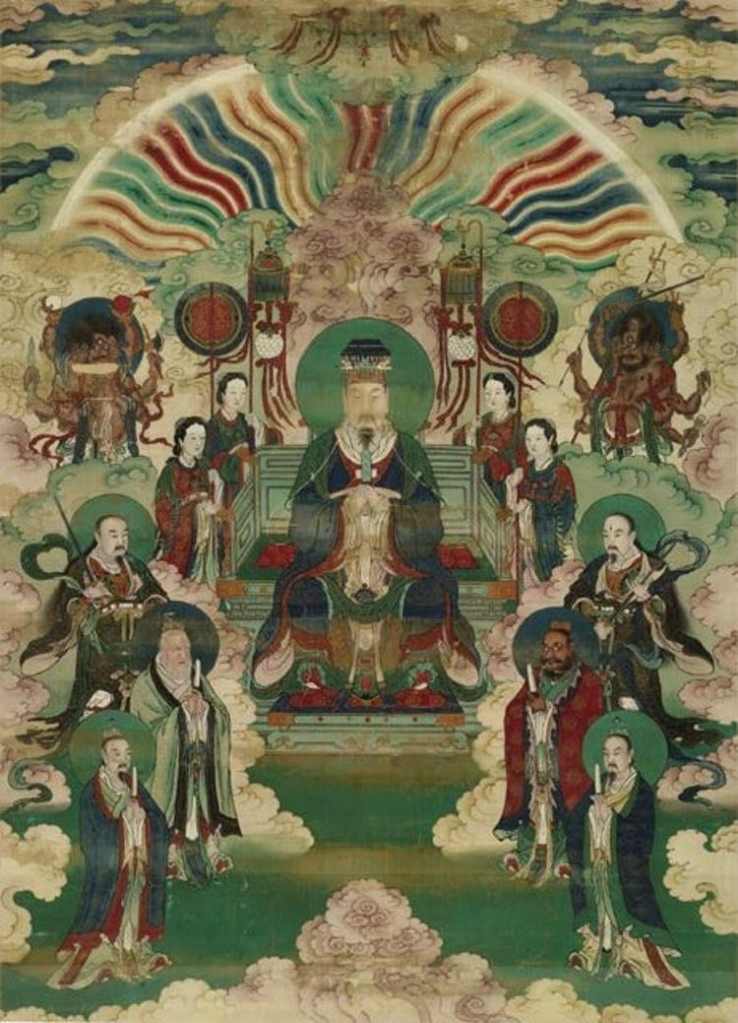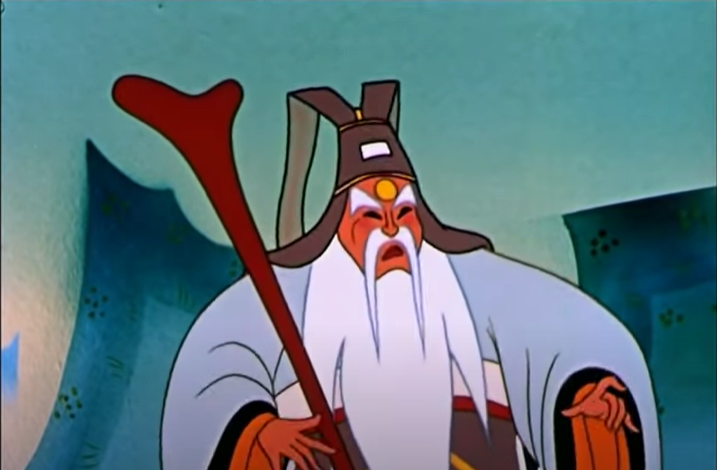We turn now to the heavens, to discuss the Most High Sage, the Merciful and Awesome Jade Emperor in the Lingxiao Cloud Palace, who one morning was holding court with his civil and military officials when the immortal Qiu Hongji1 came forth with a report: “Your Majesty, Aoguang, Dragon King of the East Sea, has arrived outside the palace, and awaits leave to enter your Majesty’s presence.” The Jade Emperor decreed that the dragon king enter, and Aoguang was escorted into Lingxiao Palace to pay his respects to the Emperor. The Dragon King handed a memorandum to the attending immortal youth, who presented it to the Jade Emperor. It said:
Your humble servant
臣 is a title or pronoun used when addressing royalty that roughly means “your humble servant.” Chinese hierarchical culture means that it is proper to reduce one’s own status when speaking to a superior. The Dragon King, though a king in his own right, refers to himself as a 小龙, a small dragon, on top of using the 臣 title.
“Your humble servant the dragon Aoguang of the Sea of the earthly Eastern Continent wishes to petition your Majesty the Merciful and Awesome Jade Emperor: In recent days, a yao born of Huaguo Mountain and living in Shuilian Cave named Sun Wukong has tyrannized this humble dragon, trespassed in our ocean residence in search of a weapon, and demanded armor with magic and violence. The water folk are in terror, the turtles have fled. The dragons of the South, West, and North Seas tremble in fear, and your servant Aoguang had no choice but to acquiesce to his demands.
We presented to him a powerful and precious iron staff, a golden phoenix feather helm, interlocking armor, and cloud walking shoes as gifts to pacify him. Yet he still continued to display his martial skill and magical powers, and only said, “Sorry to have inconvenienced you!” He is truly unparalleled in power and we are powerless against him.2 Thus your humble servant is here to submit a report and petition for heaven’s judgement, that the heavenly forces may arrest this evildoer and restore peace to the oceans below.”
The Jade Emperor issued his decree: “Master Dragon may return to his ocean. We hereby order our generals engage in the capture of this criminal.”3 The Dragon King knelt and bowed in gratitude and left.
The venerable Taoist Master Ge4 then approached with another report: “Your Majesty, King Qinguang from the Peaceful Realms, on behalf of the shepherd of the dead, the Womb of the Earth Boddhisatva, has come make a report.” An immortal maiden received the report and presented it to the Jade Emperor. It said:
“The Peaceful Realms are the nether world of the earth. The heavens have immortals as the underworld has demons, such is the natural balance of yin and yang. Beasts and fowl live and die in a neverending cycle. Male and female, they reproduce. This is the way of the world and the way it ever shall be. However, recently, a heaven-born monkey yao from Shuilian Cave in Huaguo Mountain named Sun Wukong violently resisted death’s summons. His magic defeated the messengers of the Peaceful Realms and his power terrorized the ten Kings of Mercy. He wreaked havoc in Senluo Palace and forcibly erased souls from the register such that the race of monkeys can no longer be summoned and will live long lives, evading reincarnation. In this humble monk’s opinion, this blasphemes against heaven. We humbly petition that the heavenly army be sent to subdue this yao in order to maintain the balance of yin and yang and preserve the peace of the underworld.”
Having read the report, the Jade Emperor decreed: “The lord of the hell may return to the underworld; our generals will be dispatched to arrest this villain.”5 King Qinguang also bowed in gratitude and left.

“In what era was this monkey yao born, that he is so accomplished in the Way?” the Emperor inquired of his immortal court. Thousand-mile Eye and Far-hearing Ear emerged from the assembly. “This monkey is the heaven-born stone monkey of 300 years ago. At the time he seemed unremarkable. In recent years he has cultivated immortality from we know not where and acquired such power that he can forcibly erase names from hell’s register.” “Which of our immortal generals will descend to the earthly realms to capture him?” the Emperor asked. Old Man Taibai, the Evening Star,6 came forth and said, “Your Majesty, in the three realms, any being with nine orifices can cultivate immortality. It’s natural that this monkey, who was formed by heaven and earth and birthed by the universe itself, has done so. Now that he has found the Way and acquired power that he can even vanquish dragons, in what way is he different from men? Your Majesty, in your compassion toward all life, why not extend a decree of conciliation, and instead summon him up to Heaven and appoint him as some minor official? His name will be in our records, and we can keep an eye on him here. If he submits to heaven’s rule, we can reward and promote him. If he does not submit, we can still capture him. On the one hand it will spare the generals an inconvenience; on the other hand we may add another immortal to our ranks.” The Jade Emperor was pleased at this suggestion, and said “It shall be as you say.” He ordered Wenqu, the star of Prose and Song,7 to compose the decree and Old Man Taibai to carry it out.

Bearing the Emperor’s decree, Taibai left the palace and descended upon his cloud to Huaguo Mountain’s Shuilian Cave. He found himself surrounded by little monkeys. “I am a messenger from Heaven with an imperial invitation for your king,” he told them. “Go inform him at once!” The monkeys passed the message from one to the next until the message reached Wukong deep within Shuilian cave: “Boss! There’s an old man outside holding a bunch of documents. He says he’s a messenger from Heaven with an imperial invitation for you!” The Handsome Monkey King was delighted and said, “Invite him inside!” He quickly smartened his appearance and went out to receive the old man.8
The Monkey King was delighted.
大喜, literally “great joy”, is a rather formal but still very commonly used phrase in the context of celebratory events. Weddings and the birth of a baby are both referred to as 大喜事.
Taibai stood in the cave entrance. Seeing Wukong, he said, “I am the Evening Star, Taibai of the West. By decree of the Jade Emperor, you are invited to Heaven to receive an imperial appointment.” Wukong laughed and said, “I am grateful for Master Star’s visit. Little ones! Prepare a banquet in our guest’s honor!” “I bear an imperial decree; I dare not linger,” Taibai protested. “If your majesty would please come with me, we can converse at our leisure after your honored appointment.” “It’s a shame that our guest must leave emptyhanded,” Wukong said. He turned to his four advisors, “Keep training the children up diligently. I will go see how it is in Heaven, and then we will all go up and live there together.” The four advisors promised to do so.
The Monkey King and the Evening Star ascended on clouds together into the sky. Having been appointed a position in Heaven, his name joins the ranks of immortalized heroes.
What kind of position will he will receive? Find out next time, in chapter four.9
1 One way to become immortal in Chinese myth is to be so accomplished during your lifetime that you ascend to Heaven after death. Qiu Hongji might refer to Qiu Chuji, a famous Taoist Master that lived in the 1100s. ↩
2 Aoguang presents a list of grievances. Chinese sentences apparently don’t require a subject if you mentioned who it was two sentences ago. ↩
3 I’ve had to add the word ‘criminal’ because apparently this verb doesn’t require a direct object in Chinese. ↩
4 This might be the 4th century Ge Hong, who may have fathered traditional Chinese medicine. ↩
5 The Emperor actually says the exact same thing he said to Aoguang, but repetition is discouraged in English. ↩
6 He is the planet Venus personified. However, the word Venus is so associated with a sexual Greek goddess that I had to come up with something completely different. ↩
7 The star Wenqu is the 4th star in the Big Dipper (Megrez), and is thought to be the patron saint/god of essayists. In ancient China, a good essay can get you a high-ranking government job, and great essayists were thought to be the star Wenqu personified. ↩
8 Receive is yet another Chinese verb that apparently does not require a direct object. ↩
9 This is actually how chapters end. Click to see my blog post about the storytelling style of Journey to the West. ↩